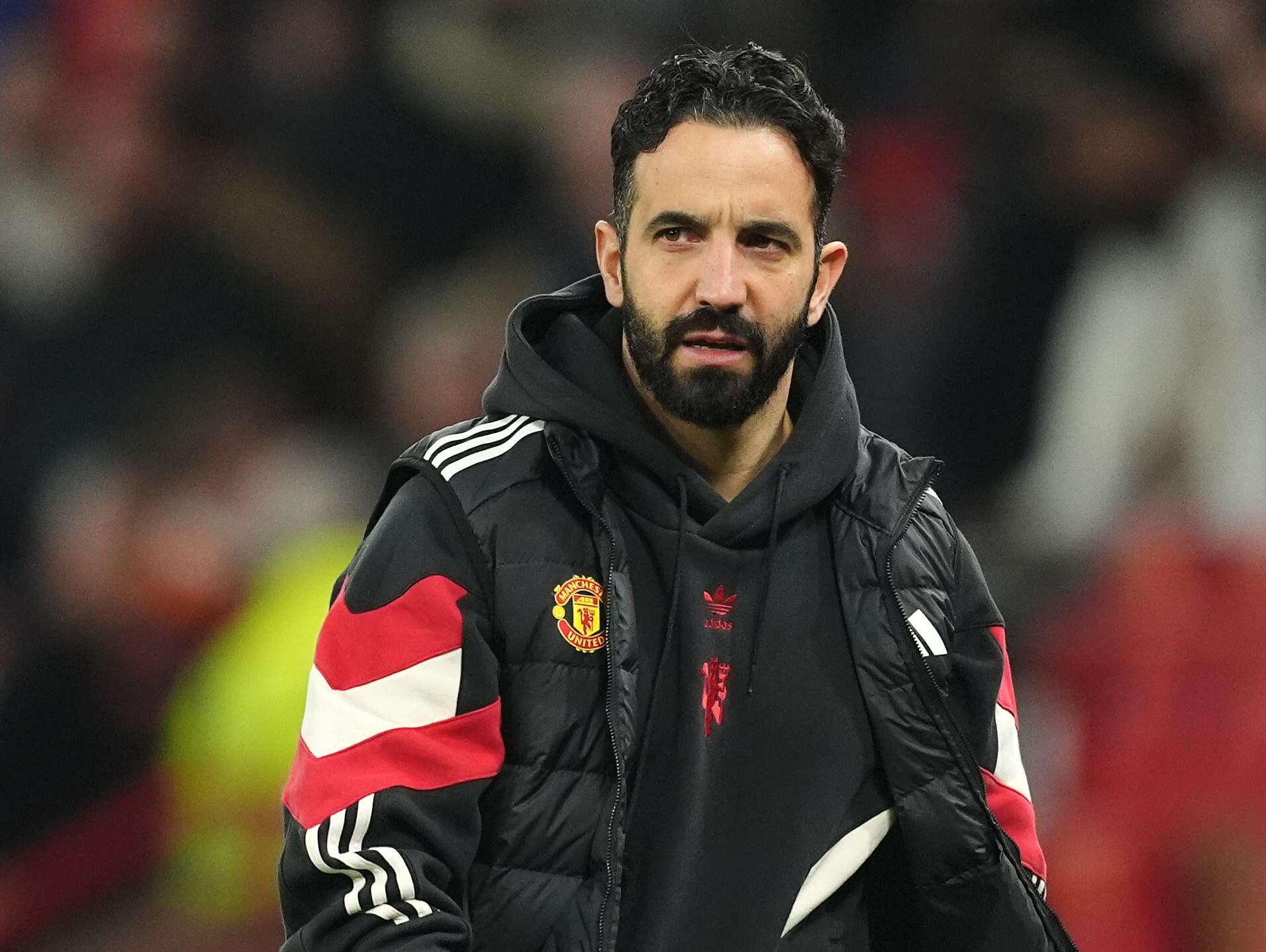Football’s weirdest kit sponsors ever
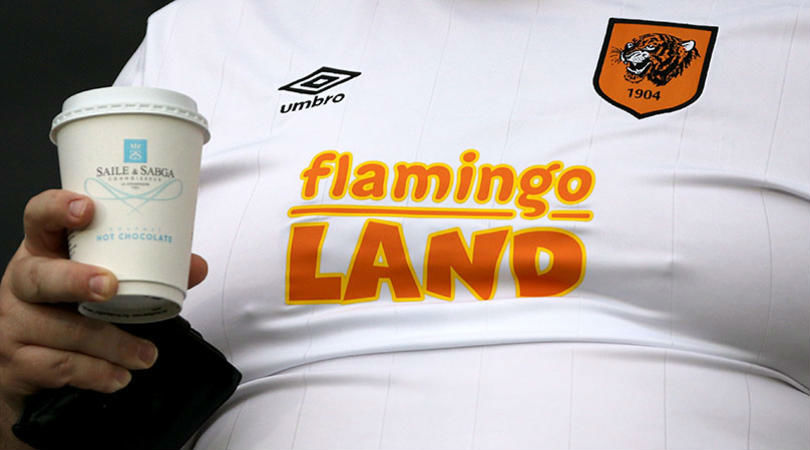
Anything for cash...
Not all football shirts are emblazoned with the logos of betting companies and their socially-acceptable older brothers in the stock-exchange game – not yet, anyway.
Football shirt sponsors tend to fit a pretty slender formula these days, but it wasn’t always the case. From Scottish pop bands and entire countries to Hollywood production houses and fast-food restaurants, clubs have sold space on their shirts (and sleeves) to some bizarre advertisers in recent years...
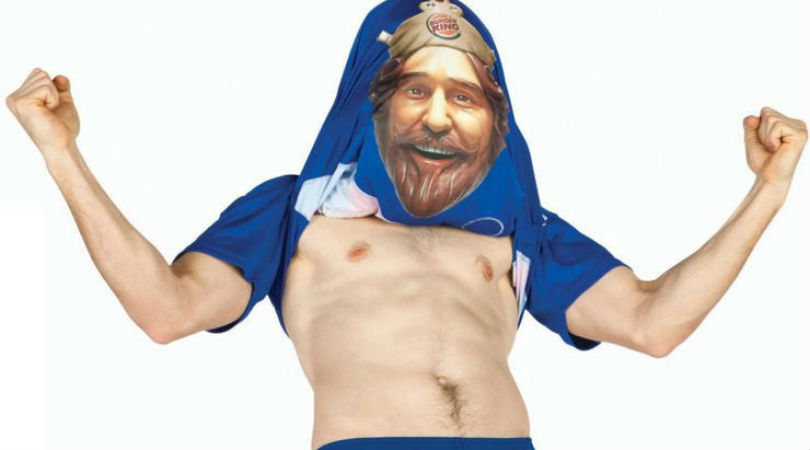
Burger King (Getafe)
While fast food and football don’t really appear to be natural bedfellows, the link-up between Burger King and Spanish side Getafe seemed to work wonders. The Madrid side had the face of the ‘Burger King’ printed on the inside of their shirts so that when a player pulled it over his head in a Ravanelli-style celebration, the monarch of meat’s mug would be displayed for all to see.
Getafe scored 58 times and finished sixth in La Liga in the 2009/10 season – their best ever finish in the top flight until 2018/19's fifth-placed slot.
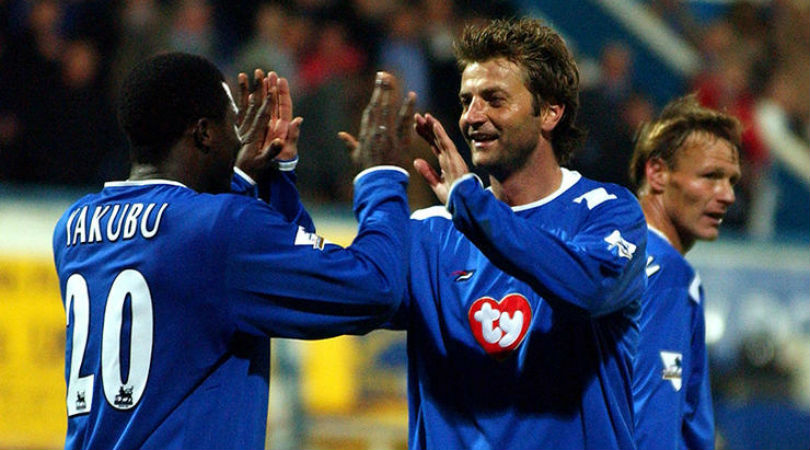
Ty (Portsmouth)
Some products are synonymous with certain football clubs. Pirelli and Inter; Quilmes and Boca Juniors; or Newcastle Brown Ale and... nope, we've lost it. Pompey’s two-year sponsorship deal with Beanie Baby makers Ty certainly wasn’t one of them.
As worn by players such as Tim Sherwood, Amdy Faye and Deon Burton, Ty is famous for being the largest manufacturer of plush toys on the planet; stuffed bears that did nothing but inexplicably change hands for large amounts of money. Ah, hang on. It all makes sense now...
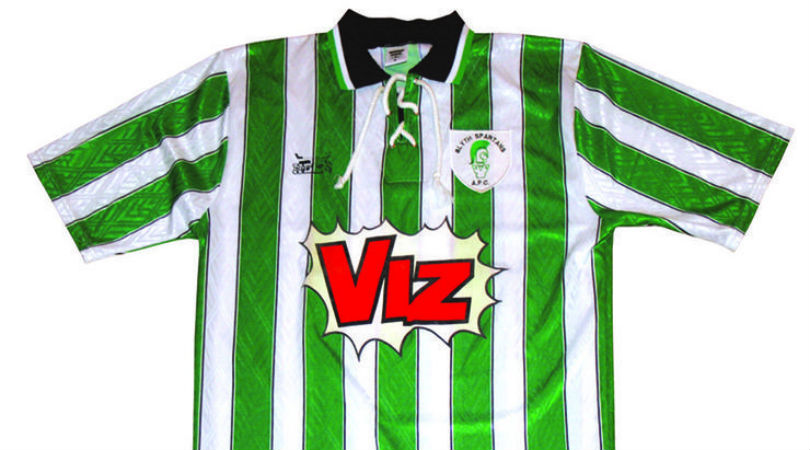
Viz (Blyth Spartans)
When you’ve blessed the world and enjoyed great success with such characters as Buster Gonad, Sid the Sexist and Terry F**kwitt, you can do pretty much whatever you please. Hence why Viz decided to sponsor Northumbrian FA Cup giant-killers Blyth Spartans.
Before doing so, Viz’s biggest contribution to football was Billy the Fish – Fulchester United’s semi-aquatic goalkeeper whose team-mates have included invisible striker Johnny X, scantily-clad Native American winger Brown Fox and pop throwback Shakin' Stevens.
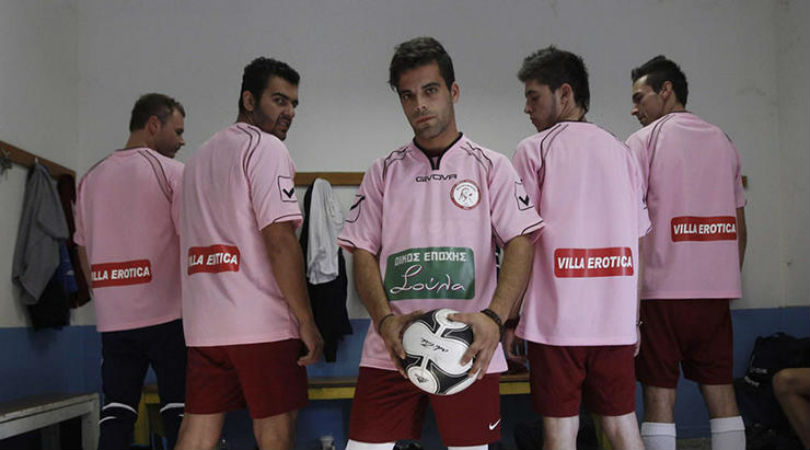
Villa Erotica (Voukefalas)
It may sound like sexy imagery of Peter Withe, but Villa Erotica is a brothel in Larissa that sponsored the local team back in 2012. The club president – blaming a lack of funding from the authorities as Greece was forced to go cap-in-hand to the EU – insisted the deal was struck for “purely economic reasons”. And as head coach Yiannis Batziolas argued, “When you see betting companies and alcohol are advertised, I think that’s far more immoral.”
Villa Erotica owner Madam Soula Alevridou is a big fan of Voukefelas and turns up for every home match. Meanwhile in nearby Trikala, Palaiopyrgos are sponsored by the local undertaker and play in all black.
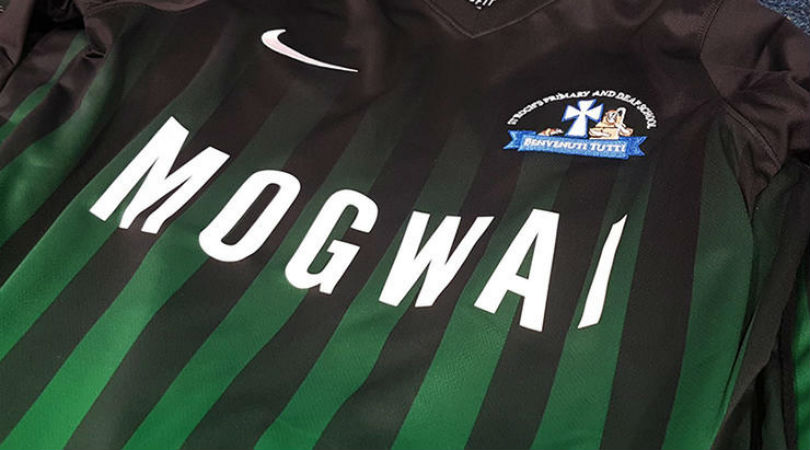
Mogwai (Saint Roch's Primary)
When Scottish rockers Mogwai released in 1997, they probably never imagined they’d be sponsoring a real one 20 years later. Rather than the local gangs that their debut record refers to, Saint Roch’s Primary is a school for kids who are deaf or hard of hearing in the Roystonhill area of Mogwai’s home city of Glasgow.
“They look amazing! We can’t thank you enough,” the school tweeted to the band with guitarist Stuart Braithwaite replying: “So happy about this.” Mogwai are far from the first Scottish band to back to youth football, with fellow rockers Biffy Clyro sponsoring Bonnyton Thistle U9s and Dundee’s The View supporting Dryburgh Athletic U11s.
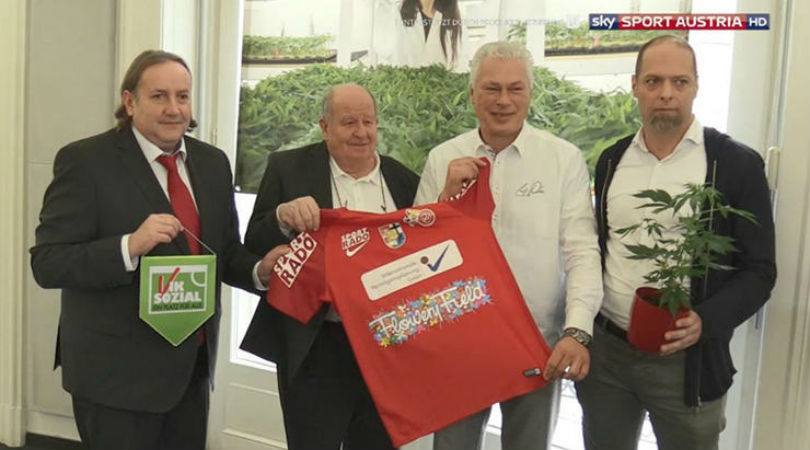
Flowery Field (Wiener Viktoria)
Austrian company Flowery Field may sound like a landscape gardening company but the reality is quite different. The specialist cannabis growers were announced as the new sponsors of Wiener Viktoria, coached by former Austrian international striker Toni Polster, in December 2017.
There’s no suggestion that the team from Austria’s fourth tier have been testing out the company’s merchandise, but they did lose 24-0 to Wienerberg the season prior so you can make your own mind up on that one.
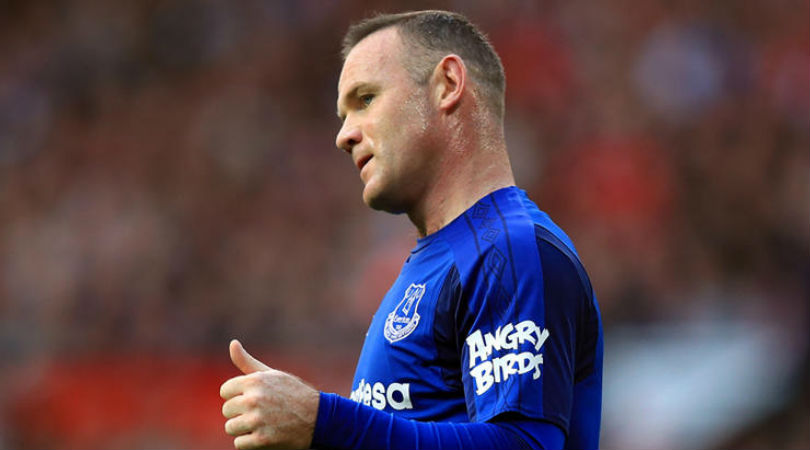
Angry Birds (Everton)
With over three billion downloads to date, the Angry Birds franchise is one of the most popular in the history of mobile gaming. Finnish developers Rovio, not content with almost total mobile domination having released a total of 16 versions of the game, are also responsible for a whole range of merchandise and a Hollywood film released in 2016, grossing close to $350m.
Everton announced the link-up with Rovio that included the Angry Birds logo on the sleeves of their home shirt and rumours of another game... with the added twist that it could very well involve Wayne Rooney. Alas, it didn't come to fruition.
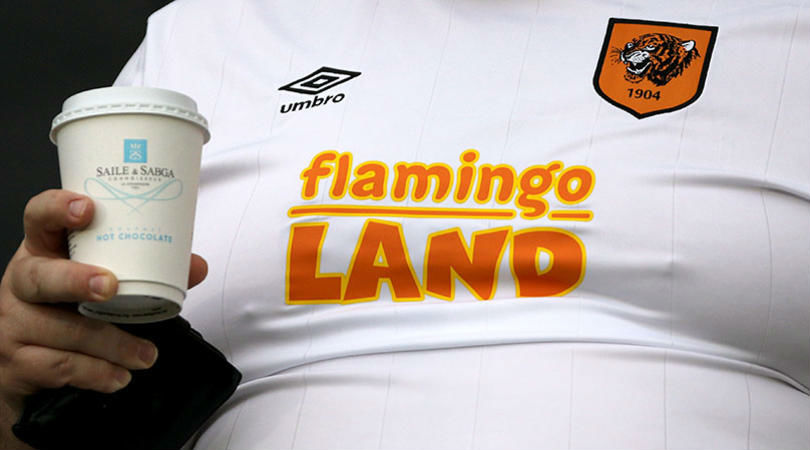
Flamingo Land (Hull)
A link-up with the local zoo-slash-theme-park probably isn’t the strangest sponsor on the list – after all, who doesn’t love a day out at the local menagerie? Our main gripe is that they called the place Flamingo Land when they’ve got lions, rhinos, hippos and even a Sumatran tiger to delight wildlife-loving Hullensians. It’s like calling your local supermarket the Broccoli Shop.
Of course, it could’ve been worse for Hull fans. Given club owner Assem Allam’s track record, they could’ve seen shirts turned pink and players forced to play every game standing on one leg.
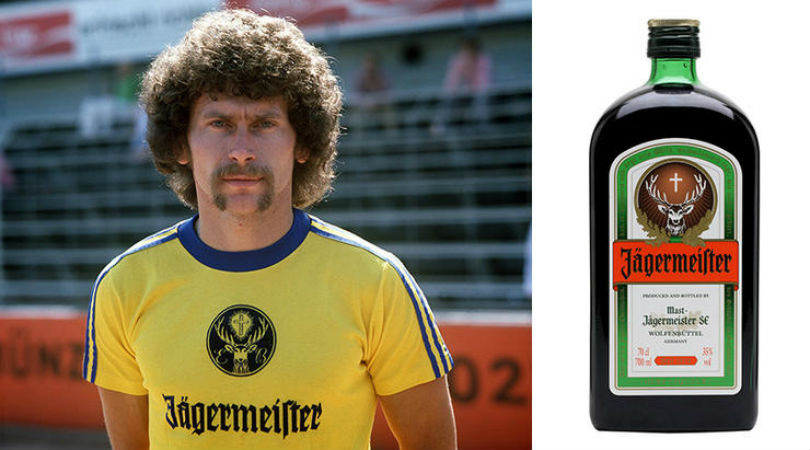
Jagermeister (Eintracht Braunschweig)
Back in 1973, shirt sponsorship wasn’t even allowed in Germany. Step forward Braunschweig-born businessman and CEO of the Mast-Jagermeister group, Gunter Mast, who saw the enormous potential of having his company’s branding all over a football shirt.
After the German FA refused his request, the club’s players voted to circumvent the regulations by changing Eintracht’s logo to the boozemongers' stag-and-burning-cross branding.
Mast went on to become president of Eintracht in the 1980s despite not being much of a football fan, but was a pioneer of sorts – Eintracht Braunschweig against Schalke in March 1973 was the first game ever to see a shirt sponsor used in Germany. The DFB changed their rules seven months later.
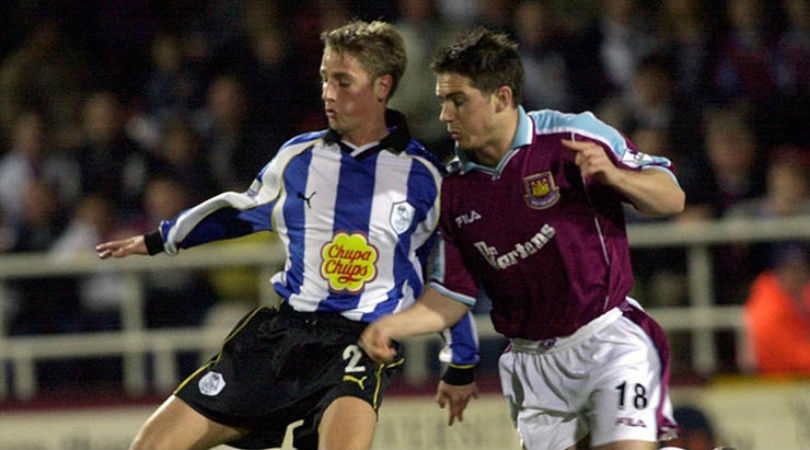
Chupa Chups (Sheffield Wednesday)
There are some football strips you could genuinely refer to as masterpieces – West Germany’s 1988 edition, for example, or the timeless Milan classic of Gullit, Van Basten and Rijkaard in the '90s. But not many clubs have had a legitimate, world-famous artist involved in designing their kit.
Admittedly Salvador Dali had no idea in 1969 that his Chupa Chups logo would appear on Sheffield Wednesday’s shirt 30 years later, but until David Hockney is being commissioned to knock something up for Bet4Eva.com, the Owls are in the minority.
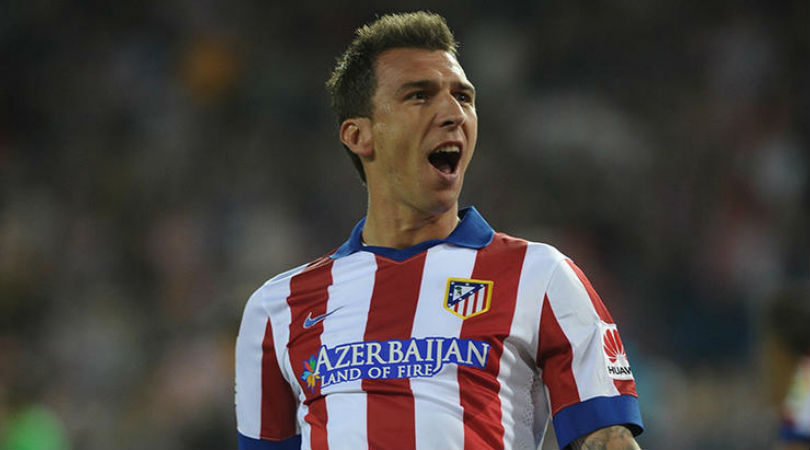
Azerbaijan (Atletico Madrid)
Sheffield United may have had Visit Malta on their shirts in 2009, but it wasn’t long ago that the idea of a football shirt carrying the name of an entire country seemed a bit weird – particularly when that nation was Azerbaijan.
Back in the halcyon days of 2014, Qatar’s propulsion of PSG towards becoming a footballing superpower was still work in progress, so Atleti’s slightly confrontational ‘LAND OF FIRE’ shirts seemed all the more bizarre.
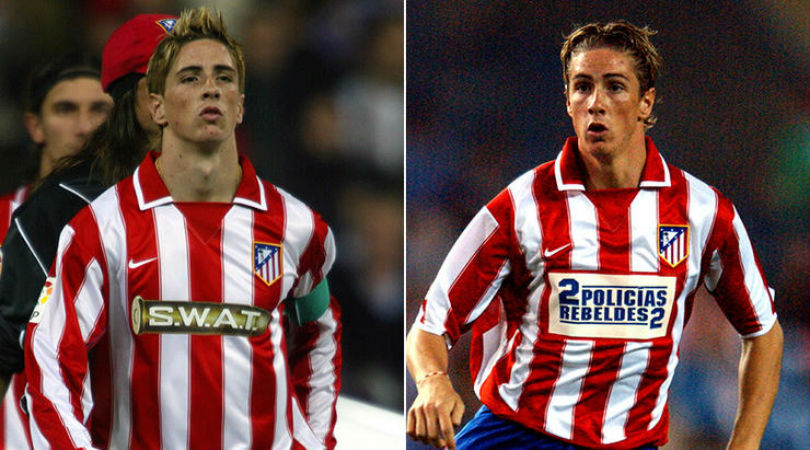
Columbia Pictures (Atletico Madrid)
Los Colchoneros’ second appearance on the list says an awful lot about their financial struggles in relatively recent times. Back in 2003, Atleti signed a sponsorship deal with movie house Columbia Pictures and advertised various films of differing quality throughout the season. And, of course, countless photo-shoots of Hollywood big shots holding the Atletico shirt, armed with an awkward smile and slightly confused look. We’re looking at you, Will Smith and Harrison Ford.
The best of the lot? Bad Boys 2, Big Fish, Spider-Man. The worst? Take your pick from a wide selection – Spanglish, Anacondas: The Hunt for the Blood Orchid, Resident Evil: Apocalypse or Hollywood Homicide.
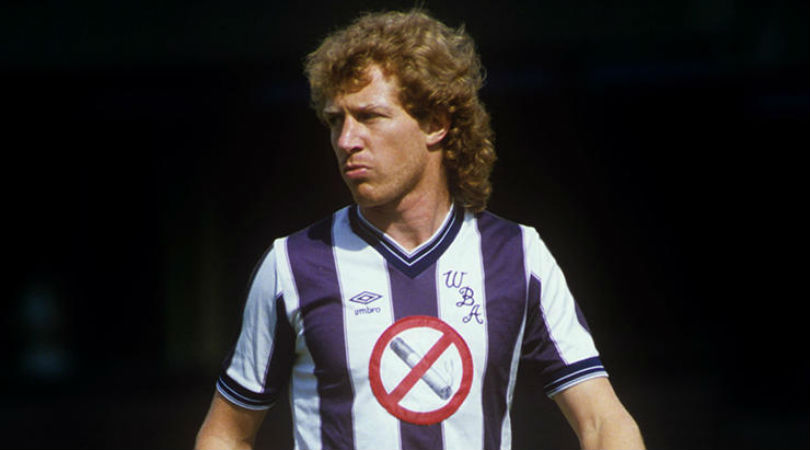
No Smoking (West Brom)
Some of the world’s finest ever players have been partial to the occasional smoke: Socrates, Zidane, Gazza, Diego Maradona, the entire Dutch 1974 World Cup squad (if rumours are to be believed, of course) and, er, Federico Macheda. But none of them every played for West Brom.
Why? Because they were much too good, of course (except for you, Federico), and also maybe because the West Midlands Health Organisation paid good money to have the ‘No Smoking’ sign emblazoned across the front of the Baggies’ shirts in the mid-1980s.
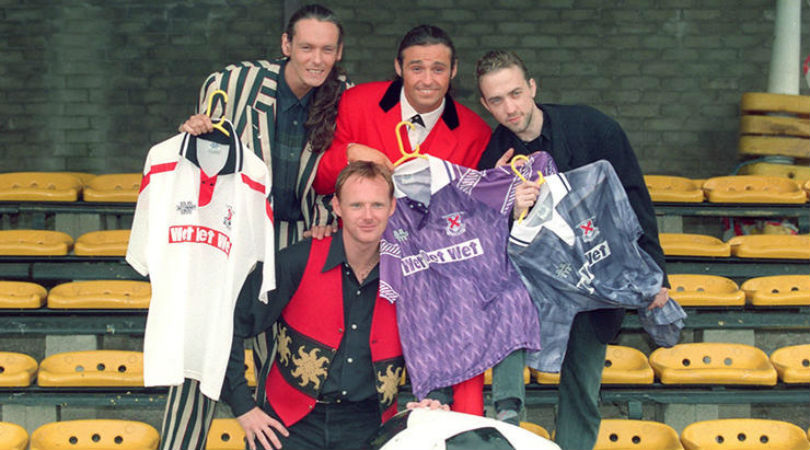
Wet Wet Wet (Clydebank)
Music and football have been connected since before Elton John was the owner at Watford, but bands sponsoring clubs is a relatively new phenomenon. Skint Records – owned by Norman Cook of Fat Boy Slim fame – sponsored Brighton’s shirts, Super Furry Animals splashed their logo across Cardiff City’s chests for the Welsh Cup in 1999, while along the Welsh coast Goldie Lookin Chain got themselves on a Newport shirt.
But Scottish balladeers Wet Wet Wet arguably started it all by pumping some of their pre- royalties into their hometown team in 1993.
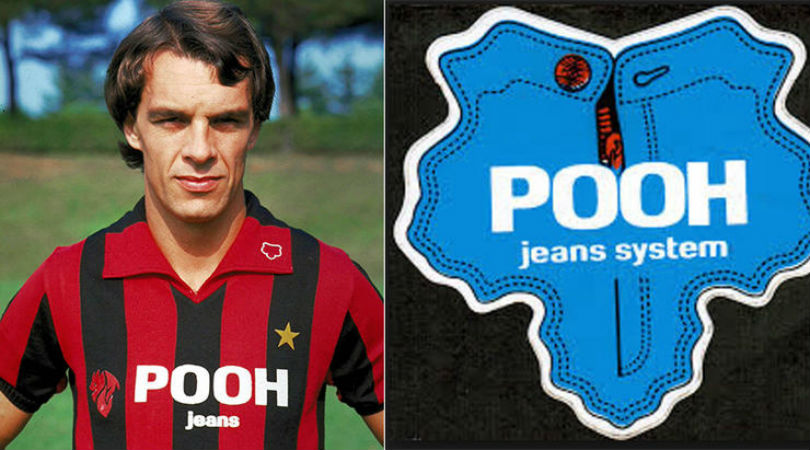
Pooh Jeans (Milan)
Ever since Mitsubishi realised their new car Pajero didn't translate well into Spanish – let's say it means a gentleman who finds pleasure in himself – businesses nowadays have to cross-check every language when coming up with a new brand name. Thankfully this wasn’t always the case.
When gaming company Sega sponsored Arsenal in 1999, Italian eyebrows were raised – think 'Pajero' in Spanish – which is presumably why they went for ‘Dreamcast’ for the away shirt. Conversely, Milan’s deal with Pooh Jeans seemed reasonably run-of-the-mill in Italy but it’ll always be met with childish laughter by the British.
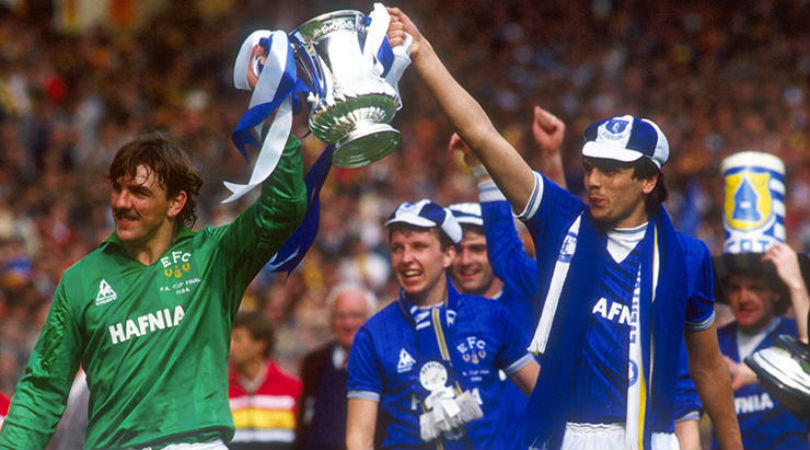
Hafnia (Everton)
Back in the Toffees’ '80s heyday, Everton’s famous blue shirts were adorned with the name Hafnia – a processed meat company from Denmark. The weird bit? Hafnia’s undoubtedly delicious products weren’t available to buy in the UK and Everton didn’t sign a Danish player until Claus Thomsen joined the club over a decade later.
The Hafnia brand disappeared not long after it vanished from the Toffees’ shirt in 1985, but recent reports have suggested that it could be on the way back. It’ll fit right in next to Angry Birds...
